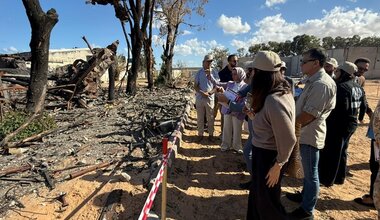UN Secretary-General’s Special Envoy for Libya, Ján Kubiš Meets High-Level Officials in Berlin, Continues His Outreach with Ministers of Foreign Affairs
BERLIN, 19 March 2021 - UN Secretary-General’s Special Envoy for Libya, Head of the United Nations Support Mission in Libya (UNSMIL) Mr. Ján Kubiš conducted a two-day official visit to Berlin from 18 to 19 March, as part of his international outreach efforts to augment the international community’s support for Libya, including the new Libyan interim executive authority.
Upon his arrival on Wednesday, the Special Envoy met with the Foreign Policy Adviser to the German Chancellor, Jan Hecker. The next day, he met with the German Minister of Foreign Affairs, Heiko Maas, followed by a joint press conference (transcript of the press conference can be found here). He later met with State Secretary Berger and State Minister Annen as well as with other senior officials from the Federal Foreign Office.
Special Envoy Kubiš also met with representatives of the Center for Civilian Peace Operations and the day after with representatives of the Ministry of Defence. While in Berlin, he had a videoconference with the Chairman of the Foreign Policy Committee of the Bundestag Mr. Roettgen, and separately with other ranking members of the Committee.
Mr. Kubiš expressed high appreciation of H.E. Chancellor Angela Merkel and the Government of Germany for their strong and continuous support for Libyans in their quest for peace, unity, stability, sovereignty, and prosperity, illustrated in the holding of the visionary Berlin Conference on Libya last year and the following Berlin process.
The Special Envoy and his interlocutors urged all UN Member States to live up to their commitments made during the Berlin Conference. They agreed on the need to expedite the implementation of the ceasefire agreement, including the withdrawal of mercenaries and foreign forces, and to respect the UN arms embargo. They pledged support to the new executive authorities while expressing their expectation that the new authorities will step up efforts to provide basic services and support to the Libyan people, unify state institutions, establish proper foundations for a comprehensive national reconciliation and ensure the full implementation of the ceasefire agreement. They urged the Libyan authorities and institutions to take all the necessary legal and other steps to enable the holding of national elections on 24 December 2021, as stipulated in the Libyan Political Dialogue Forum Roadmap (LPDF), and all leaders to honor their commitments and to heed the wishes and expectations of the people of Libya that strongly support the holding of the elections in December 2021. They confirmed the unified stance of the international community in support of the LPDF Roadmap leading towards the elections
The Special Envoy thanked Germany, all international partners, and regional actors including the African Union, European Union, and the League of Arab States for being well aligned in support of the positive progress taking place in Libya.
Continuing his consultations with the international partners, the Special Envoy held separate virtual meetings with Minister of Foreign Affairs of Norway, Ine Marie Eriksen Søreide, and with State Secretary for Foreign Affairs of Spain, Cristina Gallach. Following his recent visit to Egypt, the Special Envoy also discussed the Libyan file in telephone calls with the Minister of Foreign Affairs of Tunisia, Othman Jerandi, Minister of Foreign Affairs of Morocco, Nasser Bourita, and Minister of Foreign Affairs of Algeria, Sabri Boukadoum. He expressed his gratitude for the support extended by neighboring countries the new authorities in Libya, noting, in particular, the trailblazing visit of HE President of the Tunisian Republic Kais Saied to Libya last Wednesday.
Finally, the SE held a meeting with UNHCR High Commissioner, Filippo Grandi, during which they tackled a broad range of issues of humanitarian and human rights nature, with a specific focus on migration. It is one of the priorities of the new Libyan government that would require enhanced international cooperation and support.
 United Nations Peacekeeping
United Nations Peacekeeping UN
UN









